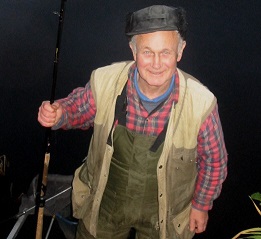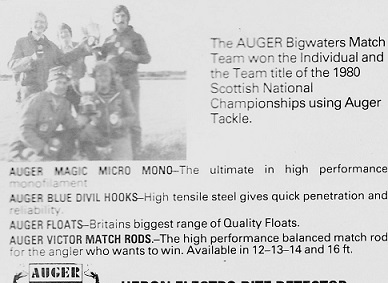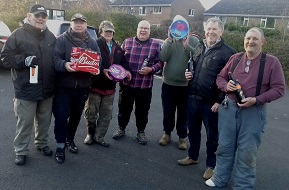<------->
Tributes have been paid to John Clayton, respected voice of the coarse
angling scene, who died after suffering a Thoracic Aortic Aneurysm (18th April 2014)
He had been ill for some time but this cruel blow came just as he seemed to be overcoming several forms of cancer.
John's contribution to the local coarse angling world was immense. He devoted more than 50 years of his life to
angling administration, helping to form the University of Newcastle Employees Angling Club in the early sixties and
was an official of the Tyne Anglers Alliance. He was articulate, well read and a true gentleman.
He was instrumental in promoting the first stockings of carp and tench north of the Tyne and of running regular club
matches on the Tyne at Close House in the sixties and seventies when weights were often in excess of 50lbs. He will
be deeply missed and on behalf of anglers in the region I would like to thank his devoted wife, Elaine, for allowing
him so much of his time to champion angling causes.
Unlike in other parts of the country, coarse fishing had to be fought for up here, and although people who come into
the sport now would never believe that 40-odd years ago you would be thrown off the Tyne and even barred for not
killing any coarse fish caught, John was one of those men who helped make a real difference.
David Hall
Tyne Rivers Trust - Position statement on Northumbrian Water's work downstream of Hexham Bridge (28 June 2013)
Everyone is very concerned about the hive of in-river activity downstream of Hexham Bridge.
As guardians of the Tyne there is no organisation more concerned than us. Our main concern
is the health of the Tyne system and we have been pressing hard for information and monitoring
all the activity since the incident first arose 3 weeks ago.
The issue is a rising main sewage pipe belonging to Northumbrian Water (NWL) that runs across
the river through Broomhaugh Island into Hexham sewage works. The concrete apron through which
the pipe runs has been undermined and whilst no leakage has occurred there is a risk that a
fracture on the unsupported pipe could occur if immediate remedial action is not taken.
We have been working with NWL to firmly establish the following key points:
1. that the rising main be made 100% safe
2. this work, which requires NWL to make a substantial intervention in the river, must be a long-term fix and
not a short-term remedial action that would require further intervention at a later date
3. fish passage of all species must be allowed at all times whilst the work is being carried out
4. all measures must be taken to prevent any pollution or siltation as a result of this work and/or a fracture of
the pipe during the works.
NWL's response to our requests is as follows:
The work will be a long-term fix (20 years plus).
The Environment Agency has approved the methodology as of 27 June 2013, therefore work will commence
immediately, subject to river conditions.
All fish will be able to pass via the south side of Broomhaugh Island whilst the works progress.
All measures have been taken to ensure there is minimal risk in terms of pollution/siltation during the works.
TRT believes that a long-term solution is in the best interests of the river, even though it means a lot of disruption
over the next few months. TRT will constantly monitor progress and will meet regularly with NWL, the Environment
Agency and the contractor team to ensure that the programme is carried out in the best interests of the Tyne river
system. Unfortunately due to the scale of this work and the very careful consideration required in carrying it out,
NWL believes the earliest completion date will be mid-October 2013.
David Ronn, Director, Tyne Rivers Trust
Tyne hydro scheme (Hexham) - plans dropped-----(18/06/2013)
The Tyne Anglers Alliance are both relieved and happy to learn that the current
plan to build an electricity generating hydro plant on the River Tyne at Hexham has been dropped.
Hexham Comunity Partnership, the body who had planned the hydro and its partner Transition Tynedale have stated
that the soaring costs, (now estimated at £ 2.5 million from an original estimate of £1 million) means that the
scheme bears too great an investment for the financial return it would realise, and they have announced the end
to their project.
Representatives of the Tyne Anglers Alliance have worked hard in conjunction with many other angling groups and
bodies who feared that the building of the hydro would have a serious effect on fish and other natural life, as
has happened elsewhere in the country. All have lobbied hard for it not to be built and warned the group that
they must accept that they would be financially responsible for replacing any fish stocks deemed to have been
lost through the actions of the hydro.
The fight to avoid any threat to the Tyne's fish stocks through the media and at open forums, has led to
improved relations between the game clubs and syndicates and the TAA which represents mainly coarse angling
interests, which is a major plus to come out of the campaign.
However the threat has not completely vanished from Hexham as the Hydro lobby are opening the door to the
possibility of a group or body who will take the financial risk, and Gillian Orrel, Chairman of Transition
Tynedale, stated how she hoped other bodies who are interested in such projects might benefit from the work
they have done.
The cessation of the Hydro scheme does not mean the end for a new fish pass which is still intended to be built.
David Hall
Coarse Angling of Derwent Reservoir
For the last two years Northumbrian Water have had a 20 peg section for coarse anglers at Derwent
Reservoir near the nature reserve on the north shore. After being approached by Steve Wood, it has been agreed
on trial basis that coarse angling is to be allowed from the dam wall from the start of this season.
After agreeing to this and since then receiving great feedback from the lads, we have decided to extend coarse
fishing opportunities for roach by including the dam wall.
Price for day at Derwent is the same as last year at £10 granted more expensive than Whittle Dene however the
guys say its worth it for exclusive quality roach fishing.
Finally We would appreciate support in encouraging anglers to fill in the returns when fishing Whittle Dene
North East Fisheries Forum
The next North East Fisheries Forum (Tyne) is on the 15th of May at EA Office, Tyneside House, Skinnerburn Road, Newcastle Business Park, Newcastle upon Tyne, NE4 7AR
(MAP)
Tea and Coffee will be served from 6.30pm
We will then hold a short Angling Trust North East AGM to appoint our volunteer Chair, Vice Chair, Secretary and Treasurer and adopt
our constitution. Full details of the AGM will be available on the Angling Trust website.
The Main Forum meeting will then start at 7.30pm
Do you have any questions or concerns about fisheries or fishing issues ?
We would be delighted to hear from you if you have any items you would like to propose for the Forum agenda,
please let us know by contacting John Cheyne via email on the address below.
If you are able to make it along to the event it would be very helpful if you could confirm your attendance by emailing john.cheyne@anglingtrust.net
The Tyne Anglers Alliance Statement on the Hexham Hydro,
written by David Hall (TAA Fisheries Officer)
I hope that my writing down several fears in advance may make the worries of myself as Fisheries Officer to the Tyne Anglers Alliance more clearer.
Firstly as previous studies (which I have copies of) talk in terms of dace migration up past Hexham and into the North Tyne to spawn, it must be made absolutely vital that no such fish are destroyed. Please remember that Tyne dace are at their northernmost tip of their range in the East side of the UK.
In addition please understand that the biggest point we can make regarding the Tyne Hydro scheme, is that if anything does go wrong with the fishery then they MUST be in a financial position to rectify things.
Indeed at the final REFERAC meeting of the National Rivers Authority which had to deal with the problems that Kielder Dam caused to the indigenous fish and fly life by Kielder it was agreed that nothing like this should ever be allowed to occur again without the body concerned first giving an assurance that if anything does go wrong that it has the finances for it to be put right at their expense, and not the public purse
This was the same edict that the Tyne Tunnel engineers agreed to when they carried out a second tunnel that could have had potential consequences only two years ago.
We are extremely nervous as such tragedies have occurred to the Tyne before despite “experts” at the time assuring us we had nothing to worry about.
May I illustrate from my chronicles what happened when Kielder went on line where the only safeguards put into effect for fish were those for hatchery bred salmon and despite my pleas the fate of every other form of life in the river was overlooked
1982 Queen Opens Kielder. Tyne still fishing well for dace etc
1986 large dace still being caught but in less quantities and no smaller younger fish.
1988-1989 a NW report comments on the obvious decline in dace numbers on North Tyne and investigations start
1989 The Kielder Study Report issued, a serious work by Dr Susan Haile with input by Dr Trevor Crisp it reported on invertebrate drop off lack of spawning success and temperature displacements obvious cause. (NW became National Rivers Authority)
1991 At even more public expense The NRA set up The 3 year Tyne Dace Study group and commission Liverpool University’s Ecological Dept to undertake this.
1992 The worst year of all. Surveys produce a nil dace result for all of the North Tyne
1993 Anthony Braithwaites letter in Journal confirms that dace have gone in 5 years
Liverpool University confirm temperature change is responsible. TAA’s David Hall and REFERAC via NRA push for changes by stopping release of ice cold water from Kielder. It is agreed. In future warmer water to be ramped off from the top layers.
1994 Onwards slow build up of dace recruitment with Rede fish repopulating N Tyne
1996 Frances McGuire comments on the effect that Kielder has had in a Friends Of The Earth publication, Dr David Bellamy joins DH in a TV program on same
2004 Over the past decade dace numbers are now virtually fully recovered on the river as the temperature levels allow successful annual recruitment once more.
However the pike population has not recovered and is now no more.


